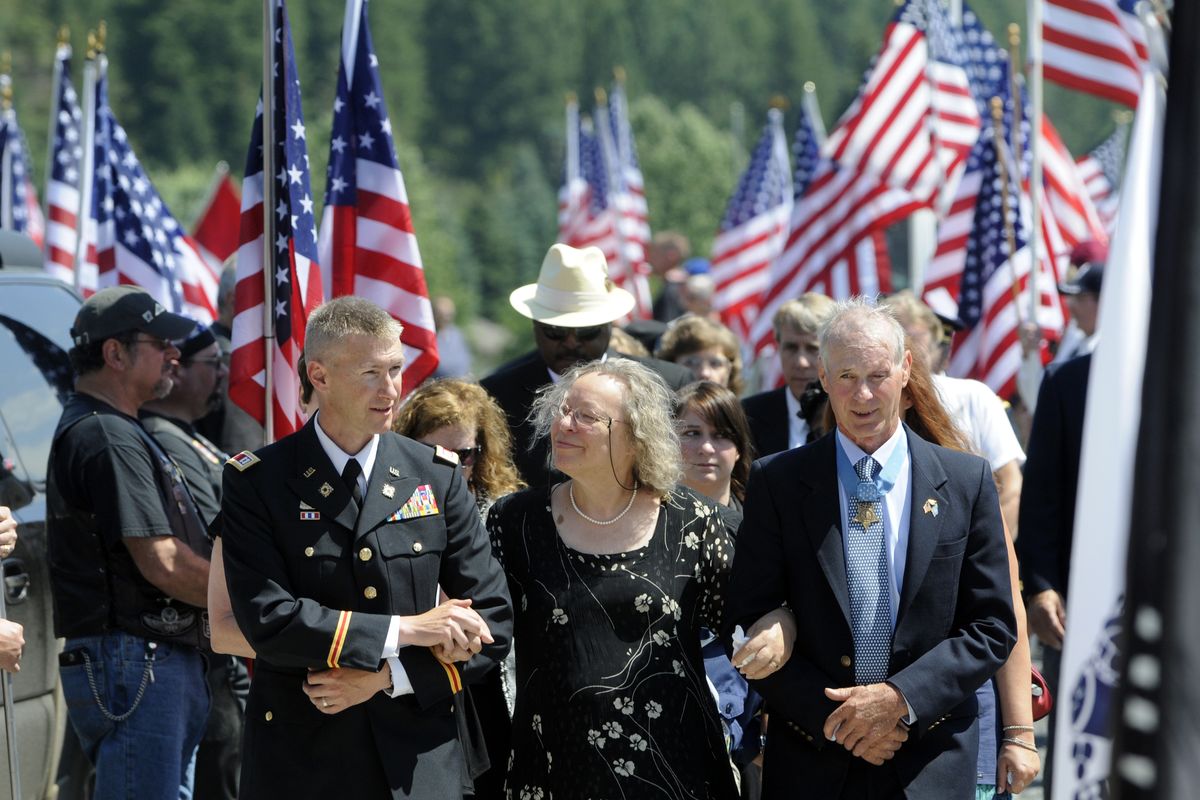A hero, in large and small ways
Family, friends share memories of Vernon Baker

ST. MARIES – Vernon Baker comforted a neighbor who had just lost his father and volunteered his labor to a newcomer the first time they met. He was gracious and humble – a hero not only for his courage under fire, but also for the way he honored 19 soldiers from his platoon who died during a decisive attack on a key German stronghold in April 1945.
“We all knew Vernon as a war hero, Medal of Honor recipient and a very, very accomplished man. But he also was a dear friend,” said Bill Fletcher, Baker’s neighbor in the Benewah Valley.
“He had quiet grace and a wonderful smile that would put anyone at ease,” added Bill Shields, another neighbor.
These were some of the memories of Baker, shared with more than 600 people who filled an auditorium and overflow room at the Church of the Nazarene near St. Maries. Baker had made his home in a mountain valley 45 miles south of here since the late 1980s. He died at home July 13 from complications of brain cancer. He was 90.
Baker was the only living black World War II veteran to receive the Medal of Honor, the nation’s highest commendation for battlefield valor. That recognition, delayed by racism, came 52 years after Baker led a dangerous assault that helped the Allies breach the Gothic Line and drive the German army out of northern Italy. His white commander deserted him and his men during that April 1945 battle.
Six other black World War II veterans received the medal posthumously at the 1997 White House ceremony where Baker received his overdue honors from President Bill Clinton. Most of Baker’s friends and neighbors first learned of his heroism a few months before the ceremony, when the Army announced it was righting a five-decade-old wrong.
While friends and neighbors touched on Baker’s heroics during the Saturday morning funeral service, they focused on his ready warmth and personable touch.
Fletcher recounted how Baker was the first person to call after his father died in June 1997. “My world just kind of stopped, quit. Then my phone rang and on the other end of that phone was Vernon Baker. With tears in his voice, he said, ‘Billy, I was so sorry I didn’t get the chance to see your father one last time before he died.’ It helped soften the blow to my heart and the pain I was feeling,” Fletcher said, turning to Baker’s widow, Heidy, and telling her he hoped he could now do the same for her.
Shields, meanwhile, told of meeting Baker shortly after buying a piece of property near Baker’s cabin. Baker offered him the use of his phone, his shower, and “he offered to help me dig a post hole,” Shields said. “What a nice gesture from a man I didn’t know.”
The next time Shields saw Baker was on a TV broadcast of the White House ceremony.
Dressed in his Cub Scout uniform, 9-year-old Vernon Pawlik talked of his grandfather now becoming part of history. Family friend Dick Shanks read one of Baker’s favorite poems, “Just a Common Soldier.” Other dignitaries read letters from the president of the NAACP, the governor of Wyoming – where Baker was born and raised – and Clinton.
Retired Navy SEAL Tom Norris, of Coeur d’Alene, who received the Medal of Honor for his rescues of downed pilots in Vietnam, attended the service and escorted Heidy Baker, along with her casualty assistance officer, Capt. David Darney, of Lewiston.
Beyond the personal memories, however, Baker’s life was best captured by a slide show than ran throughout the service. The images showed Baker the outdoorsman with a deer he harvested and the mountain lion that met its end by stalking him. There were pictures of him scuba diving, parachuting and, with his trademark humor, modeling a pair of red flannel long underwear. There was the photo of the dogsled team that carried Heidy to his cabin during her first visit in February 1990. They had met during a chance encounter at the Spokane airport the previous fall.
A few pictures showed him in a suit or tux, while others captured him in a checkered flannel shirt and wool cap, reminiscent of the wool hat he wore into battle because he felt his Army helmet inhibited his hearing. Many depicted Baker enjoying time with his wife, grandson and stepdaughter Alexandra, a cup of coffee often at hand.
In addition to hundreds from the St. Maries area, a sea of military uniforms, the blue caps of Legionnaires, the brown caps of VFW members, and the faces of people from across the country filled the auditorium. The Idaho Patriot Guard lined the entrance to the auditorium as flag bearers.
The Idaho Honor Guard delivered crisp military honors, from a rotating two-man guard at Baker’s urn throughout the service to a 21-gun salute and taps in a nearby field after the service. As the last volley echoed across the forested valley and the last note faded, mourners gathered for a reception and potluck – and to share memories of a quiet, humble man who, despite his reputation as a fierce combat soldier, will most be remembered for his grace and compassion.
Baker makes his final journey to Washington, D.C., in September for burial at Arlington National Cemetery.